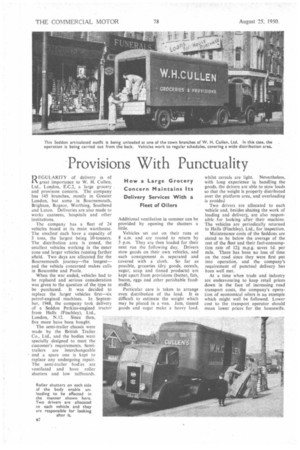Provisions With Punctuality
Page 36

If you've noticed an error in this article please click here to report it so we can fix it.
How a Large Grocery Concern Maintains Its Delivery Services With a Fleet of Oilers
REGULARITY of delivery is of great importance to W. H. Cullen, Ltd., London, E.C.2, a large grocery and provision concern. The company has 145 branches, mostly in Greater London, but some in Bournemouth, Brighton, Bognor, Worthing, Southend and Luton. Deliveries are also made to works canteens, hospitals and other institutions.
The company has a fleet of 24 vehicles based at its main warehouse. The smallest each have a capacity of 3 tons, the largest being 10-tonners. The distribution area is zoned, the smallest vehicles working in the inner zone and larger vehicles running farther afield. Two days are allocated for the Bournemouth journey—the longest— and the vehicle concerned makes calls in Boscombe and Poole.
When the war ended, vehicles had to be replaced and serious consideration was given to the question of the type to be purchased. It was decided to replace the larger vehicles first—six petrol-engined machines. In September, 1948, the company took delivery of a Seddon Perkins-engined tractor from Halls (Finchley), Ltd., London, N.12. Since then, five more have been bought.
The semi-trailer chassis were made by the British Trailer Co.. Ltd., and the bodies were specially designed to meet the customer's requirements. Semitrailers are interchangeable and a spare one is kept to replace any undergoing repair. The semi-trailer bodes are ventilated and have roller shutters and low tailboards. Additional ventilation in summer can be provided by opening the shutters a little.
Vehicles set out on their runs al 8 a.m. and are routed to return by 3 p.m. They are then loaded for their next run the following day. Drivers Stow goods on their own vehicles, and each consignment is separated and covered with a cloth. So far as possible, groceries (dry goods, cereals, sugar, soap and tinned products) are kept apart from provisions (butter, fats, bacon, eggs and other perishable foodstuffs).
Particular care is taken to arrange even distribution of the load. It is difficult to estimate the weight which may be placed in a van. Jam, tinned goods and sugar make a heavy load. whilst cereals are light. Nevertheless, with lung experience in handling the goods, the drivers are able to stow loads so that the weight Is properly distributed over the platform area, and overloading is avoided Two drivers are allocated to each vehicle and, besides sharing the work of loading and delivery, are also responsible for looking after their machine. The vehicles are periodically returned to Halls (Finchley), Ltd., for inspection.
Maintenance costs of the Seddons are stated to be below the average of the rest of the fleet and their fuel-consumption rate of 12i m.p.g. saves ld. per mile. There has been no loss of time on the road since they were first put into operation, and the company's requirement of punctual delivery has been well met.
At a time when trade and industry are endeavouring to keep retail prices down in the face of increasing road transport costs, the company's operation of economical oilers is an example which might well be followed. Lower cost to the transport operator should mean lower prices for the housewife.












































































